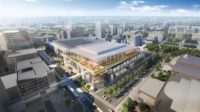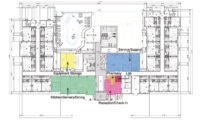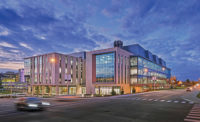As devastating as the economic shutdowns caused by the COVID-19 pandemic have been, some Midwest contractors and owners have been able to fast-forward their projects.
With many businesses and schools closed, and people working at home rather than commuting, timelines for projects during the pandemic have been adjusted, reaping savings in time and money.
The Indiana Dept. of Transportation rephased about 20 road construction and renovation projects across the state.
“Much of that work would’ve been staged and spread out over four to five months, but we’ve been able to tighten that,” said Scott Manning, a spokesman for the department.
One example is the $61-million reconstruction of six miles of I-70, one of the busiest highways in the state. It extends from just east of the I-65 north split in downtown Indianapolis to east of the I-465 interchange. The project involves the replacement of 75 miles of pavement and 28 bridge decks. The interstate also was widened by 8 ft on each side.
“This is one of the projects we were most aggressive about re-phasing,” Manning said.
“Much of [the I-70] work would’ve been staged and spread out over four to five months, but we’ve been able to tighten that.”
– Scott Manning, Spokesman, Indiana Dept. of Transportation
Originally slated to take about six to eight months, the design-build project has been reduced by three months, which has resulted in a savings of $3.5 million and a projected completion date of August, said Manning, attributing the savings to contractor Milestone Contractors LP not having to close down traffic lanes completely and not having to remobilize and repeatedly move barriers that were set up to direct traffic.
Another time-saver was created thanks to a new law in Indiana that allows for e-signing of documents.
The new law “is not related to the pandemic, but it’s more efficient for us,” said Manning. “We’re adopting more paperless transactions between our agency and contractors. We’re not couriering paper back and forth to get signatures.”
On the other side of the state, Jacob Lenson, assistant vice chancellor of campus planning, project and space management at Purdue University Northwest, also was able to capitalize on the pandemic shutdown to move projects forward at the school’s campuses in Hammond and Westville.
“We have a mixed bag of projects going on,” said Lenson, who typically oversees about $10 million in projects a year.
“One of the things that the university system does as a whole is to bid projects pretty early—in November and December—even though our projects don’t start until May,” Lenson said. “I was fortunate that our projects were bid before there was any whiff of COVID-19.”
That meant that as soon as the school confirmed that students and faculty would not be attending in-person classes, Lenson asked contractors if they could move up their schedules.
Most said yes, according to Lenson, who said they also quickly adapted COVID-19 safety measures including social distancing and limiting in-person meetings.
The school plans its projects around a 13-week spring and summer time frame when many students and teachers are not on campus. Lenson says Purdue Northwest strives to get projects done before the start of the school year for safety, efficiency and to properly unveil and celebrate new facilities.
“We don’t have a lot of luck with opening buildings mid-semester,” he said. “Students may not recognize them or even know they are there.”
While most projects were accelerated, renovation of a former child care center into a new 3,565-sq-ft counseling center on the Hammond campus hit a snag when one of the contractors had to shut down work after a worker tested positive for COVID-19.
“That project is behind by about a week. We’ll have to make that up by the start of the school year,” Lenson said.
Another hurdle the university experienced was in the supply chain, which had been one of Lenson’s top concerns when the pandemic first occurred. Delivery of $1 million in furniture was delayed for its recently constructed $40-million Bioscience Innovation Building.
“Our shipment of furniture that we ordered in October was delayed, and now (as of June 3) we only have about 40 to 50% of it,” he said. “The manufacturer had completely shut down and didn’t communicate with us. We had one truck with furniture show up out of nowhere.”
Construction of a pedestrian pathway that involved tearing up an asphalt parking lot to create green space on the Hammond campus that had been slated to be done by mid-August is expected to be completed by the end of July. Normally, the project would have been divided into four phases with remobilization of services each time.
“Anytime we phase a project it costs a lot more,” said Lenson. “For this project, we only had to bring in the demolition guy and the fence guy once. We saved on remobilization fees.”
Lenson plans to hold more meetings by video conference rather than in person even after the pandemic procedures are lifted.
In the past, face-to-face, biweekly meetings with contractors mostly coming from Indiana, the Chicago area and Michigan were the preferred method.
“We had more productive meetings with video conference platforms, and now I may not be limited to local contractors,” he said.
Another school that benefited from the pandemic shutdown was Parkway Schools near St. Louis. McCarthy Building Cos. is overseeing about $55 million in construction projects for the K-12 district that has about 18,000 students.
With most of district’s schools having been built from the 1940s through the ’70s, construction work often begins with asbestos abatement. With students not in school, the district got a jump-start on abatement that usually takes about two weeks and also saved another two weeks in remobilization efforts on most projects.
The district saw contractors make herculean efforts to meet the district’s needs despite supply chain challenges during the shutdown.
In one case the district had been informed that the delivery of two switchboards for electrical rooms would be delayed by 10 weeks because a manufacturer had to close down a foreign factory.
“But the manufacturer found a way to make it locally,” said Brian Baldwin, McCarthy’s project manager for the school district. “The manufacturing side is becoming creative and making sure they meet customers’ demands.”
In another instance, a manufacturer couldn’t deliver a compressor for a rooftop heating and cooling unit. The manufacturer agreed to install a standard compressor and to provide the specified digital compressor when it becomes available.
James Swingle, manager of planning and construction for the school district, said McCarthy’s field experience has been beneficial to the district.
“They have relationships in the industry and trade partnerships, and we’ve been the beneficiary of those partnerships,” Swingle said.
The experience of working during the pandemic has provided lessons similar to the ones that Lenson and Manning noted.
“We’ve ratcheted down to holding only our most important meetings and are starting and ending them on time,” Swingle said. “This experience has also shown that we can still be productive and socially distant.”







Post a comment to this article
Report Abusive Comment